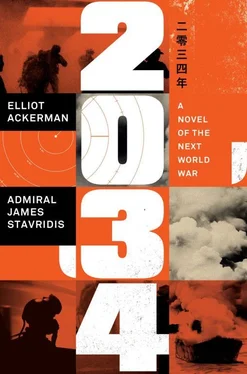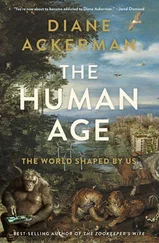He would explain this to Zhao Leji, and to whoever else from the Politburo attended this meeting. Lin Bao imagined that Zhao Leji would place some of the blame for the Zheng He on his shoulders. After all, it had been his name on the deployment orders, not Zhao Leji’s, or that of any other member of the Politburo. They would likely accuse him of having exceeded his authority in a time of war, but nothing more than that. They would want to be rid of him. After peace was negotiated with the Americans, it would be easy for Lin Bao to convince Zhao Leji to turn the other way while he defected. If anything, a defection would help prove the substance behind the accusations Zhao Leji would surely level, which was that Lin Bao was untrustworthy, a secret ally of the Americans. Good riddance, they’d say. And he would return to the country of his mother’s birth. Maybe even to Newport, with his family. To teach.
By the time Lin Bao had walked to the far end of the corridor on the fifth floor, these ideas had calmed him, so that when the security man swiped the key card and gestured with a low wave of his hand for Lin Bao to step inside, he did so without any trace of fear.
He took a half dozen steps into the empty room. It wasn’t a suite. It was a single. There was a queen-size bed.
A console.
A dresser.
Everything, including the carpeted floor, was covered with plastic tarps, as though the room were undergoing a renovation.
Lin Bao stepped toward the bed.
Resting on its edge was a golf club, a 2-iron. He lifted it up. The familiar weight was pleasant in his hands. A note was attached to the shaft with a piece of string. He took a deep breath, filling his lungs, knowing it was likely the last such breath he might take. The writing on the card was blocky, the symbols formed by an untutored hand, the hand of a peasant. It read, This time you picked wrong. I am sorry.
It was unsigned. That’s how they survive, he thought. They never sign their names to anything.
From behind Lin Bao, a series of steps squished over the plastic. He could feel the presence of the large security man at his back, plus the three others who no doubt stood by the door, waiting to help clean up the mess. Lin Bao had an instinct to shut his eyes, but he fought it off. He’d watch, until the very end, in this grim room where there was little worth seeing. He peered out the solitary window, to the equally grim Beijing skyline. The idea that this—not his daughter’s face, nor the open ocean he loved—would be the last thing he ever saw filled him with self-pity and regret. He felt his throat constrict with those emotions in the same moment he felt the cold press of metal against the soft hairs at the base of his neck.
Keep your eyes open, he demanded of himself.
He continued to stare out the window, which faced to the southeast, generally in the direction of sunrise and the Pacific. Though it was late, a brilliant light like twenty sunrises all at once kept expanding unrestrained from that direction, as though the light itself had the potential to consume everything. This was coupled by an incredible noise that shook the windows and assured that no one heard the single gunshot.
What is that on the horizon? Lin Bao wondered. It was his last thought as he toppled forward onto the bed.
CODA

The Horizon
10:18 September 12, 2035 (GMT+4:30)
Isfahan
Finally, he was home. The trip to Bandar Abbas had been the first of any kind Major General Qassem Farshad had made in the past year since his promotion and subsequent retirement. He dropped his bags by the front door, went straight to the bedroom, and stripped out of his uniform. He’d forgotten how much he hated wearing it. Or, put another way, he had forgotten how much he’d come to enjoy not wearing it. He thought over the difference between the two as he showered and changed into the polyester tracksuit that had become his new uniform around the house. While he tied on his sneakers, he reminded himself that he didn’t harbor any real grudges against Bagheri and the others in the high command. He simply wanted to embrace this new life.
On the return flight from Bandar Abbas, he had worked on his memoir, as he did most every morning, and now he was looking forward to his customary walk around his property and to settling back into the comfort of his routine. When the invitation to Bandar Abbas had arrived some weeks before, Farshad had initially refused it. Ever since the Victory of the Strait, as the high command had anointed his last battle, his country had heaped honor after honor on his shoulders, from his second awarding of the Order of the Fath to a mention by the Supreme Leader in a nationally televised address to the Parliament. Had such recognition arisen from another battle, one where the difference between victory and defeat hadn’t come down to which direction the wind was blowing, perhaps Farshad would have felt otherwise about accepting the invitation.
Now, finally home, he first thought to unpack but then decided he would do it that night. He would instead have a long walk, to stretch his legs. He went to the kitchen and prepared himself his usual simple lunch: a boiled egg, a piece of bread, some olives. He placed the meal in a paper sack and set out across his property. Trees canopied his route. The first autumn colors already touched the rims of their leaves, and in the early afternoon the cool air hinted at the passing of the seasons. Late-blooming wildflowers lined his path as he headed along dirt-packed trails toward the ribbon of stream bisecting his property.
Farshad could hardly believe it had been more than a year since those Russian paratroopers had been blown out to sea. He couldn’t quite decide whether a great deal of time had passed or not very much at all. When he thought of the specifics of the battle in the strait, it felt like not very much. When he thought of how much the world had changed since then, it seemed as though far more than a year had passed. Farshad now understood himself as a small actor in a far broader war, one that had resulted in a profound global realignment.
When Farshad was bracing for a Russian attack against his island fortifications, he had no inkling that the Indians had intervened on the side of peace by sinking a Chinese carrier and destroying an American fighter squadron. Tragically, a single pilot from that squadron managed to slip both the Indian interceptors and Chinese air defenses, dropping his payload on Shanghai. These many months later the city remained a charred, radioactive wasteland. The death toll had exceeded thirty million. After each of the nuclear attacks international markets plummeted. Crops failed. Infectious diseases spread. Radiation poisoning promised to contaminate generations. The devastation exceeded Farshad’s capacity for comprehension. Though he’d spent his entire adult life at war, not even he could grasp such losses.
Compared to the trilateral conflict between the Americans, Chinese, and Indians, his country’s contest with the Russians felt in retrospect like little more than an intramural squabble. In Parliament and among the high command, there had been some question as to whether the captured Russian prisoners qualified as “prisoners of war,” seeing as the two nations were not in a state of formal hostilities. In Tehran, zealots within the government had threatened to classify the Russians as “bandits” and execute them accordingly. However, when as part of the New Delhi Peace Accords negotiated by the Indians, the United Nations announced its reorganization, the Supreme Leader astutely leveraged clemency for the imprisoned Russians as a way to secure a permanent Iranian seat on the Security Council, which the Indians had already insisted on relocating from New York City to Mumbai as a precondition of delivering a direly needed multiyear aid package to the United States.
Читать дальше













